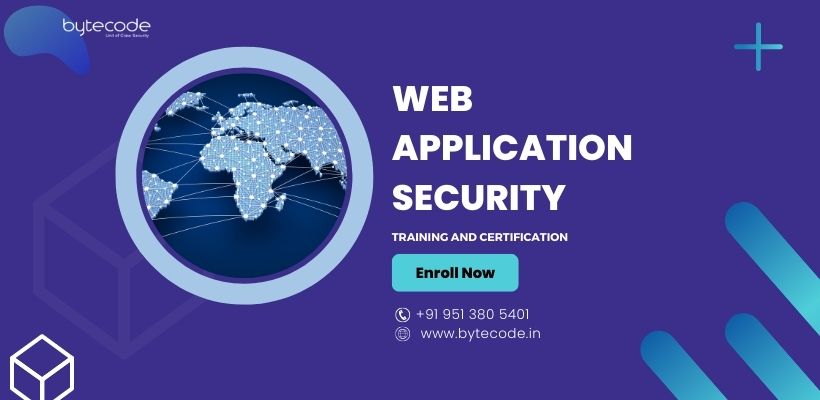Web Application Security Course with AI in Delhi
Enroll in Delhi’s Web Application Security Course with AI for a thorough and hands-on education from mentors and teachers with extensive experience. Bytecode Security offers thorough Web Application Security Training in Delhi and is ready to provide an outstanding Web Pentesting Course. At our institutional facilities in Saket and Laxmi Nagar, this training is given by highly skilled and competent trainers. This particular AI-based Web Security Course, which is available at all of our locations, is intended to provide students in the Delhi NCR area with the information and abilities needed to get the prestigious Application Security Certification.

Web Application Security Course with AI Online
Bytecode Security institutions provide a valid online Web Application Security Course with AI in response to the time constraints faced by persons who wish to participate in Web Penetration Courses. Sessions of Virtual Instructor-Led Training (VILT) are used to provide this course. By signing up for the prestigious Web Application Security Course with AI Online, students can access this resource at their convenience.
In addition, Bytecode Security is a well-known worldwide training partner in information security, serving those who want to advance their careers in Web Application Security Courses with AI in Delhi and other broad Cyber Security domains.
What will you learn in the Web Application Security Course with AI?
Our world-class cybersecurity training institution provides well-regarded Web Application Security Certification Courses in the Delhi NCR area through a strict process. Our staff of mentors and trainers is qualified to convey the knowledge and abilities required for a variety of work approaches in practical settings. Several internationally renowned Web Application Security Experts successfully enhance and validate the curriculum associated with the Best Application Security Training program.
Since student welfare is a top priority for Bytecode Security, the company has hired mentors and teachers with extensive expertise and adaptability who are officially connected with the Web Application Security Certification program. Many different vulnerability topics are covered in this course, such as QL Injection, XSS, PHP Injection, Indirect Object Reference, CSRF, and many more.
Web Application Security Course Online
Bytecode Security institutions provide a valid online Web Application Security Course in response to the time constraints faced by persons who wish to participate in Web Penetration Courses. Sessions of Virtual Instructor-Led Training (VILT) are used to provide this course. By signing up for the prestigious Web Application Security Course Online, students can access this resource at their convenience.
In addition, Bytecode Security is a well-known worldwide training partner in information security, serving those who want to advance their careers in Web Application Security Courses in Delhi and other broad Cyber Security domains.
Choose the Best Institute to Learn Web Application Security Courses with AI in Delhi — Bytecode Security
When you attend a highly reputable and suitable cybersecurity institution in India, like Bytecode Security, the Best Cybersecurity Training Institute in Delhi NCR that delivers world-class AI fundamental-based training from highly experienced training professionals, this learning AI-based training would certainly be enjoyable and simple. Therefore, for significant business progress, you can select Bytecode Security if you’re eager to learn more about the best Web Application Security Course with AI in Delhi.
Furthermore, Bytecode Security offers top-notch Web Application Security Courses with AI and real mentoring from highly qualified professionals. In addition to providing mentors for training that meets international standards, Bytecode Security offers top-notch study materials that have been thoroughly examined by a number of web app security specialists worldwide, ensuring that our students receive only the most effective and difficult-to-find instructional resources.
As a result, selecting Bytecode Security above any other organization in the wild is a thoughtful move. Don’t wait any longer, call now at +91-9513805401 to have a word with our superb educational counselors.

Introduction of AI in Web Application Security Course with AI
The Web Application Security Course with AI by Bytecode Security has a decent overview of Artificial Intelligence or AI in this course. Individuals with a keen intention to do something in this trajectory of web application security can enroll in this particular course and become superb cybersecurity experts, having a great inclination towards AI-based fundamentals while employing varied web application security features in the practical world.
Hence, if anyone is nicely interested in starting a fantastic career in web application security with AI fundamentals, they can opt for the Web Application Security Course with AI by Bytecode Security, the Best Cybersecurity Training Institute in Delhi NCR. To check for the same, call now at +91-9513805401 and have a word with our superb educational counselors to seek the best piece of an educational counseling session.
Students can attend classes from their homes. It takes less time to attend an online class. At the same time, various groups can attend online classes with bytecode Cyber Security From home.
Web Application Security Course with AI Syllabus
Web Application Security Course with AI in Delhi covers 24 comprehensive modules.
- Module 01: Introduction
- Module 02: Owasp Top 10
- Module 03: Recon for bug hunting With AI
- Module 04: Advanced SQL Injection
- Module 05: Command injection With AI
- Module 06: Session Management and Broken Authentication Vulnerability
- Module 07: Cross-Site Request Forgery (CSRF)
- Module 08: Server Site Request Forgery (SSRF)
- Module 09: Cross-Site Scripting (XSS) With AI
- Module 10: Insecure Direct Object Reference (IDOR)
- Module 11: Sensitive Data Exposure and Information Disclose With AI
- Module 12: Server Site Template Injection (SSTI) With AI
- Module 13: Multi-Factor Authentication Bypass
- Module 14: HTTP Request Smuggling
- Module 15: External Control of File Name or Path
- Module 16: Local File Inclusion (LFI) and Remote File Inclusion (RFI)
- Module 17: Directory Path Traversal
- Module 18: HTML Injection
- Module 19: Host Header Injection
- Module 20: File Upload Vulnerability With AI
- Module 21: JWT Token Attack
- Module 22: Flood Attack on the Web With AI
- Module 23: API Testing With AI
- Module 24: Report Writing With AI
Course Duration
- Course Duration: 60 Hours
- Course Level: Intermediate
- Include: Training Certificate
- Language: English, Hindi
- Course Delivery: Classroom Training
- Course pdf: Click here to Download
Our Students Placed in Companies




Our Google Reviews
Frequently Asked Questions
About Web Application Security Course
What is Web application attack?
A Web Application Attack is a series of intentional activities carried out by a hostile party with the goal of impeding, disrupting, taking control of, or permanently disabling the functioning of a particular target web application. The act of performing illegal access to a target web application with the objective of collecting the database for the intent of producing criminal income through the sales of such database to rival or competitor businesses.
What is SQL Query Injection?
A common attack technique known as SQL Query injection, or SQLI, is the execution of malicious SQL code to alter backend data and gain unauthorized access to data that was meant to be restricted.
This particular dataset might include a variety of elements in different quantities, such as user lists, private customer databases, or sensitive organizational information.
What are application attacks?
One particular kind of cyberattack that tries to change the database connected to the targeted web application is called an application attack. Database preservation and the security of related online applications can be accomplished through the implementation of a wide range of techniques, tactics, and frameworks that are offered by a reliable Web Application Security Course with AI, like the one offered by Bytecode Security.
What is meant by Web security?
Web security is the set of guidelines that a skilled web security analyst employs to guard against potential hackers trying to access a database connected to a particular web application without authorization and jeopardizing the integrity of the database.
To protect websites, web applications, and web services, information security must be divided into separate components.
If you'd like to learn more about it, Bytecode Security, the Best Cybersecurity Training Institute in India, offers appropriate Web Application Security Courses with AI in Delhi. To speak with one of our extremely knowledgeable and experienced educational counselors, give us a call at +91-9513805401.
What is Web security requirements?
To verify and assure the security of web applications, several features that cover different requirements or web security protocols must be recognized and put into practice. The 4 main prerequisites for Web Service Security are non-repudiation, data protection, authorization, and authentication.
Apart from these requirements, if any person wishes to learn all the corresponding web application security with AI basics, they can seek guidance from our world-class training professionals by getting mentorship in the earliest batch possible. To learn more about this course or anything else, kindly contact our best-in-class study consultants at our round-the-clock hotline number +91-9513805401 and get the best advice from them.
Are Web Apps Safe?
Web application databases can be secured and made available for use in the intended web application for a variety of service-oriented functions by putting in place a well-thought-out protection strategy.
What is web security and its types?
The term web security describes a group of defenses put in place to protect a website's database, which can be compromised by potential attackers using a variety of strategies. Furthermore, there exist five discrete classifications of online security types, which are listed as follows:
- Critical infrastructure security.
- Application security.
- Network security.
- Cloud security.
- Internet of Things (IoT) security
How do websites get hacked?
Websites are frequently compromised by a variety of techniques used by possible remote attackers. In order to extract sensitive information from the targeted website, the hackers use a variety of techniques, including brute-force attacks that involve guessing usernames and passwords, trying generic passwords, using password-generating tools, using social engineering or phishing emails, and exploiting links.
What is Web security example?
The prevalent instances of web security risks encompass computer viruses, data breaches, Denial of Service (DoS) attacks, and many attack routes.
Is Cyber Security hard?
Cyber Security is little bit hard and stressful but job in the cyber security can be high satisfying and get a premium salary.
Which is an example of a Web security threat?
Web security dangers include, but are not limited to, malware, data breaches, DoS attacks, and multiple avenues of attack. In addition to that, there are multiple web security threats that are continuously coming to light with each passing day. A person may enroll in the globally-standard Web Application Security Course through Bytecode Security, a leading provider of cybersecurity training programs in the vicinity of NCT of Delhi.
For inquiry purposes, call +91-9513805401 and talk to our duly experienced educational consultants.





























